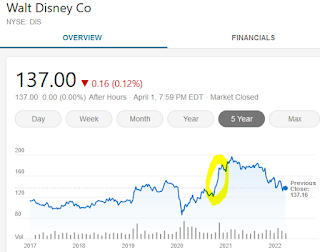Shares (stocks) are mostly held by institutional investors like insurance companies, pensions and mutual funds. Those funds are run by professional managers who are bound by a set of principles lumped under the name of "Fiduciary Responsibility".
Fiduciary Responsibility revolves around preservation of capital and maximizing gains.
Over the last five years, Disney stock has offered institutional investors NOTHING after inflation is factored in.
The last big, upward jump in stock price (highlighted in yellow) started when Mr Biden was announced the winner over President Trump. Coincidence?
Flogging dead horses
One of the Design Managers for General Motors once remarked "The American consumer does not know beans about what he will want in five years."
.jpg) |
| If Oprah Winfrey was a motor-vehicle... |
That same American consumer looked at the bulbous, whale-like 1991 Caprice and took their discretionary dollars elsewhere. The 1991 Caprice left many potential buyers with the impression it was designed by a bunch of second-rate designers who had nothing but contempt for the market segment and their efforts were snide, passive-aggressive inside-jokes that were cartoonish in their crudeness.
The Caprice went out of production in 1996.
General Motors declared bankruptcy thirteen years later.
I fully expect history to rhyme. Companies run by people who hold their customers in contempt do not last long.

Companies come and go. None are too big to fail. In the final analysis, the market decides.
ReplyDeleteReally, in 2022 you can say that?
DeleteWe don't have free market capitalism. We have cronyism, with an added flavoring of capitalism.
Disney, like many other legacy companies, is running on residual good will from past achievements. That good will will run out over time and customers will turn away to companies who serve them better, in part by insulting them less.
ReplyDeleteWay back in 84 I went to the Cummins Engine Engineering Center in Columbus Indiana to study the new "B" series engine . Remarkable engineering produced a world changing power plant that we subsequently retrofitted into millions of "P" series delivery trucks around the world and the USA . Fleet average mileage went from 7 or 8 mpg to 12 to 16 mpg and longevity went from 120,000 to 500,000 . The old experienced engineers also thought about the placement and access of every nut , bolt , and component on that series of engines . They realized that if us average mechanics working on these engines hated working on them it would not be successful . Simplicity was designed into the engine . We loved it and they made many sheckles from the sales . Find me a "P" series truck that has something other than a "B" series engine in it today . We need that same spirit and energy now in the automotive world . Instead we have restrictive gubmint over-regulation complicating and perverting the cars of today .
ReplyDeleteERJ, The Critical Drinker (if you have never heard or watched him) has spoken on this. He did a video on the extension of franchises and noted how many are essentially based on nostalgia for the past movies, even if the current movies destroy the franchise (looking at you, Star Wars and Marvel. Also Jurassic Park). The producers can always count on a certain segment of the population to come out to see the latest "X" movie.
ReplyDeleteBusinesses have forgotten that they are ultimately in business to turn a profit. At some point, this is going to come back and bite them. One wishes that institutional investors paid as much attention to returns as they did to everything else.